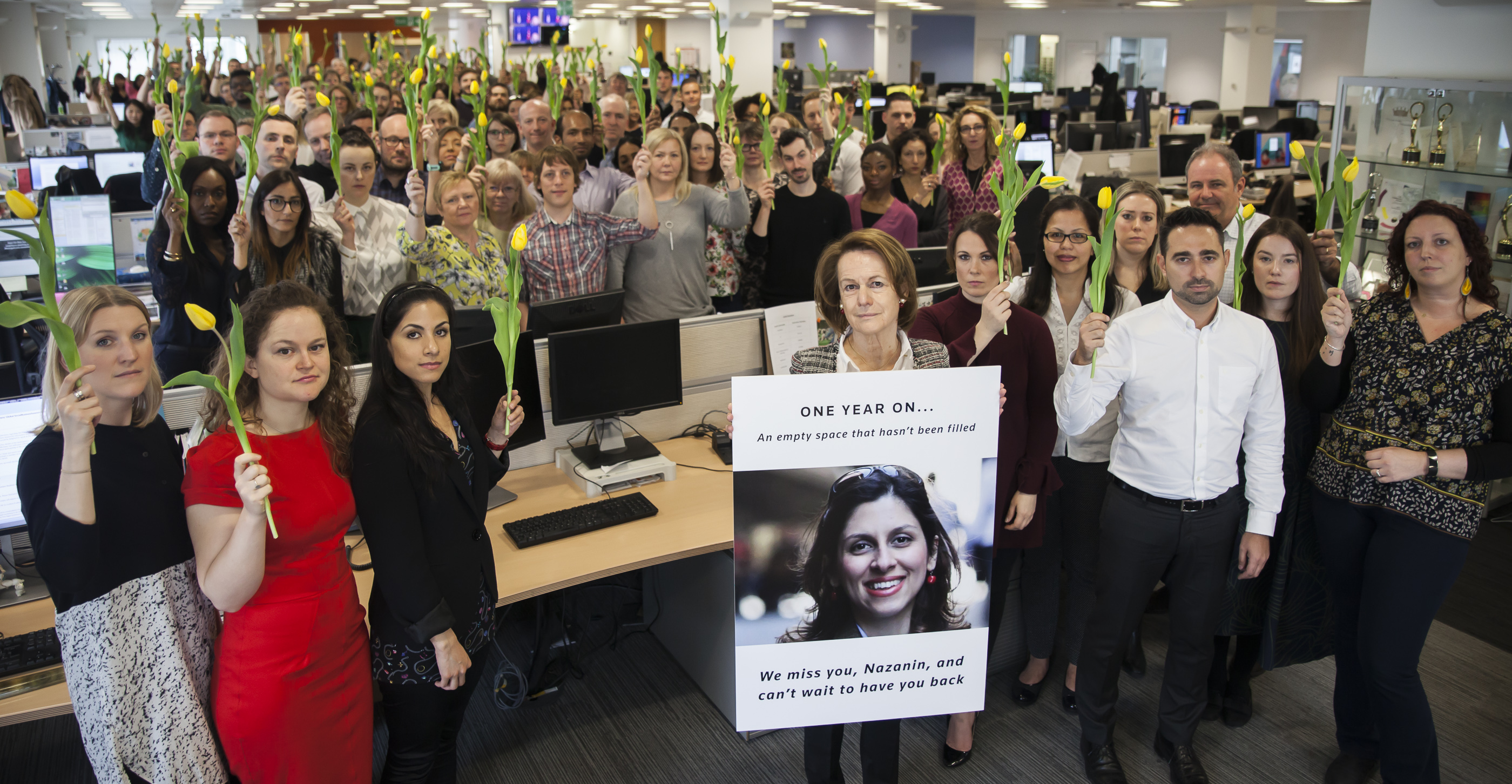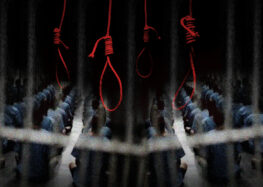Supporters Mark One-Year Anniversary of Nazanin Zaghari-Ratcliffe’s Imprisonment in Iran

Nazanin Zaghari-Ratcliffe’s colleagues stand around her empty desk at the Thomson Reuters Foundation’s office in London.
Supporters Invited to Contribute to “One Day of Freedom” Campaign
Iranian-British citizen Nazanin Zaghari-Ratcliffe never thought she would be detained by the Revolutionary Guards’ Intelligence Organization when she and her 22-month-old daughter arrived at Tehran’s international airport, on their way back home to the UK on April 3, 2016.
One year later, the 38-year-old employee of the Thomson Reuters Foundation is in Evin Prison’s Women’s Ward in Tehran serving a five-year sentence for unspecified “national security charges.”
On the anniversary of the forced separation, her husband Richard Ratcliffe asked supporters to describe their ideal “one day of freedom” on a Facebook page for the Free Nazanin Ratcliffe campaign, which has received nearly 900,000 supportive signatures.
“My fondest dream has always been to arrive at our home, you ask me if I want to have a cup of tea, then make me one,” wrote Zaghari-Ratcliffe in a message for the event. “I just sit back and watch you two play. This is the image I had most when in solitary confinement.”
“I would like to put a huge paper on the wall in our sitting room and draw a world in which there are no prisons, walls or fences,” she said. “And let Gabriella (daughter) do the coloring.”
The postings will be turned into a book “to show and inspire Nazanin (and the other prisoners) when she is released…ways to rediscover life and all its maybes when freedom finally is returned,” said Ratcliffe in a statement on April 2, 2017.
“It has been a long year of separation, a year of our lives interrupted,” he added. “Rather than feel sad for us this anniversary—please lend us your enthusiasms, your ‘happy to be alive’ days, your ideas for the one days to come.”
Despite being referred to a neurological specialist on February 19 after repeated bouts of fainting, panic attacks, headaches, and spinal disc pain, the prosecutor’s office told the family that it is awaiting for a judge to approve her admission, said the statement.
She has also been banned from calling her husband in a reversal of a decision by the prosecutor’s office allowing her to call him once a month.
Upon being arrested at the Tehran Imam Khomeini International Airport last year following a holiday visit with family, Zaghari-Ratcliffe’s daughter Gabriella was placed in the care of her elderly Iran-based grandparents.
The authorities have blocked attempts to bring her back home to the UK. Ratcliffe has meanwhile not been able to travel to Iran for safety reasons.
Zaghari-Ratcliffe has still not been told the alleged crime she was convicted of, even during the appeal process, according to the statement.
On April 3, 49 members of the European Parliament (MEP) released a joint letter calling for the release of EU citizens currently imprisoned in Iran, including Zaghari-Ratcliffe.
The letter said the MEPs are “gravely concerned by the situation of dual EU-Iranian nationals being held prisoner in Iran on vaguely-worded charges, subject to unfair trials, as well as to inhumane conditions in prison, including the denial of medical care.”
“In the context of the new emerging relationship of dialogue between Iran and Europe (following the nuclear deal signed in 2015), we urge you to release all of these prisoners, and in the meantime, guarantee them improved conditions of detention,” added the letter.
Fellow Prisoners Imagine One Day of Freedom
Some of Zaghari-Ratcliffe’s fellow inmates also contributed to the “One Day of Freedom” event.
“The biggest pain for a mother is to be away from her children,” wrote prominent human rights defender Narges Mohammadi, serving a 16-year sentence for her peaceful activism. “It’s nearly two years now that I haven’t seen my 10-year-old twins.”
Fariba Kamalbadi, a leader of Iran’s persecuted Baha’i community serving a 20-year prison sentence for her religious beliefs, said: “I always wished to spend my whole first night next to my family members and watch them sleep, to make up for the time passed away so quickly when they came for a visit while I was in prison.”
“I think of my children, my husband and my family,” wrote fellow Baha’i prisoner of conscience, Mahvash Shahriari, also serving a 20-year sentence. “I think of my fellow prisoners, of prisoners of conscience. I’ll float in my dreams. We’ll hold each others’ hands, with all the people around the world, like a rainbow of red, black, yellow and white colors, and sing a song of peace, and love is the only witness of our friendship.”
Colleagues Lend Support
On April 3, Zaghari-Ratcliffe’s colleagues at the Thomson Reuters Foundation gathered around her empty desk in the charity’s London-based office, where she worked in the media development program.
“It has been one year since Nazanin was arrested, separated from her daughter and subsequently sentenced to five years in jail on unknown charges,” said CEO Monique Villa in a statement released that day. “This unbearable situation has lasted way too long, and has caused Nazanin and her family unimaginable pain.”
“Today we stand united in remembering Nazanin,” she added. “I am totally convinced of her innocence. We continue to urge for her immediate release and hope for her swift return.”
Judiciary’s Attack
In an unsigned commentary piece titled “London’s Suspicious Sense of Responsibility to Free Ratcliffe,” the judiciary’s official news site, Mizan, issued renewed claims against her and the charity organization.
“The primary mission given to Nazanin Zaghari-Ratcliffe by the Thomson Reuters Foundation was to advance media and cyber projects for the purpose of overthrow and espionage,” said the article. “Why are they trying so hard to free a security convict?”
The judiciary’s ongoing imprisonment of dual nationals, usually arrested by the Revolutionary Guards’ Intelligence Organization or the Intelligence Ministry, reflects hardliners’ efforts to prevent the engagement with the West that the Rouhani administration has sought to encourage.
Iranian-American dual citizen Robin (Reza) Shahini, held since July 2016, has been sentenced to 18 years in prison; Iranian-American businessman Siamak Namazi, held since October 2015 and his Iranian-American father, 80-year-old Bagher Namazi, held since February 2016, have both been sentenced to ten years in prison; Iranian-Austrian dual citizen Kamran Ghaderi, held since January 2016, has also been sentenced to 10 years in prison; British-Iranian dual national Roya Saberi Nobakht, held since October 2013, has been sentenced to seven years in prison; and Iranian-British citizen Kamal Foroughi, held since May 2011, has also been sentenced to seven years in prison.
Iranian-born Swedish resident Ahmadreza Jalili, held since April 2016, and Iranian-American citizen Karan Vafadari and his Iranian wife Afarin Nayssari, held since July 2016, have not been sentenced yet.
*This story was updated on April 3, 2017 at 11:46 am eastern time to reflect the MEP’s statement and the judiciary’s article.





